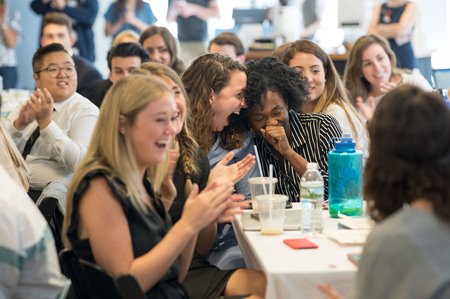Aug 10, 2018
 Anyone who has ever had an advertising internship knows that the experience is exciting and challenging. While some internship programs consign eager young talent to fetching coffee and making photo copies, for those who are lucky enough to apprentice at agencies that genuinely engage interns in real-life client assignments, the experience can be exhilarating and life-changing.
Anyone who has ever had an advertising internship knows that the experience is exciting and challenging. While some internship programs consign eager young talent to fetching coffee and making photo copies, for those who are lucky enough to apprentice at agencies that genuinely engage interns in real-life client assignments, the experience can be exhilarating and life-changing.
I know from personal experience the tremendous impact interns can make in an organization. In 2014, I had the good fortune of starting my career as an intern at Publicis Health. Publicis Health’s unique, award-winning internship program demands a lot and sets a high bar for what’s expected from its summer intern class. The centerpiece of Publicis Health’s internship program is interns working on real campaigns for real clients. Most recently, the client assignments have focused on developing campaigns that target young people, i.e., the cohort of the intern class, on behalf of a deserving non-profit organization.
This year, Publicis Health’s 2018 summer intern class worked with the National Alliance on Mental Illness to create a national campaign to destigmatize mental illness. With more than 80 participating interns split into groups of 10, each team spent a portion of its summer internship coming up with ideas, which were pitched to a judging panel comprised of senior leaders from NAMI and Publicis Health.
Four years after I graduated with my summer intern class, I was invited to manage the 2018 Publicis Health summer intern project. Having once gone on this journey as a college student myself and now working full-time at a Publicis Health agency, I was excited to help lead a program that had profoundly influenced my own career progression. The intern project kicked off at the beginning of the summer with an introduction to the NAMI partnership by Alexandra von Plato, Publicis Health’s CEO.
The core concept of the overarching relationship with NAMI is to raise awareness and destigmatize mental illness, with a focus on reaching teens and young adults. Considering that 75% of mental illnesses are diagnosed before age 24, the idea to involve our interns made sense, since they represent and are closest to the campaign’s target audience. The interns had four weeks to complete their projects, which finished with live pitches to executive leadership and key stakeholders from NAMI.
As I worked on the brief, it quickly became evident that mental health conditions don’t just effect individuals who are suffering. Mental illness touches everyone. This realization led to the defining thesis of the project—“We need each other; we are better together.”
 After weeks of concept ideation, content development, and hard work, the final presentation day arrived. With more than 200 people in attendance, intern teams from across the U.S. presented their ideas to a standing-room-only crowd at Publicis Health’s New York headquarters. It was up to the intern teams to seize the opportunity and present with confidence. And they did.
After weeks of concept ideation, content development, and hard work, the final presentation day arrived. With more than 200 people in attendance, intern teams from across the U.S. presented their ideas to a standing-room-only crowd at Publicis Health’s New York headquarters. It was up to the intern teams to seize the opportunity and present with confidence. And they did.
As each team took the stage, I was impressed, captivated and proud of the work they produced. I also was hopeful, knowing that once the interns went back to their respective schools, they’d be empowered to raise discussions around the topic of mental health.
Millions of Americans are touched by mental illness directly or indirectly on a daily basis and because of the persistent stigma surrounding mental health conditions, many in need of help and support don’t often seek it out—sometimes with tragic results. As a community of young professionals, our summer interns worked to help educate and continue to be educated on how to effectively support their peers.
I’m grateful for the opportunity to amplify NAMI’s message, to empower our interns with an experience that they can take back to their campuses, and to work for an organization that recognizes the importance of mental health care. We are better together, and together we can be a part of the movement to cure stigma.

